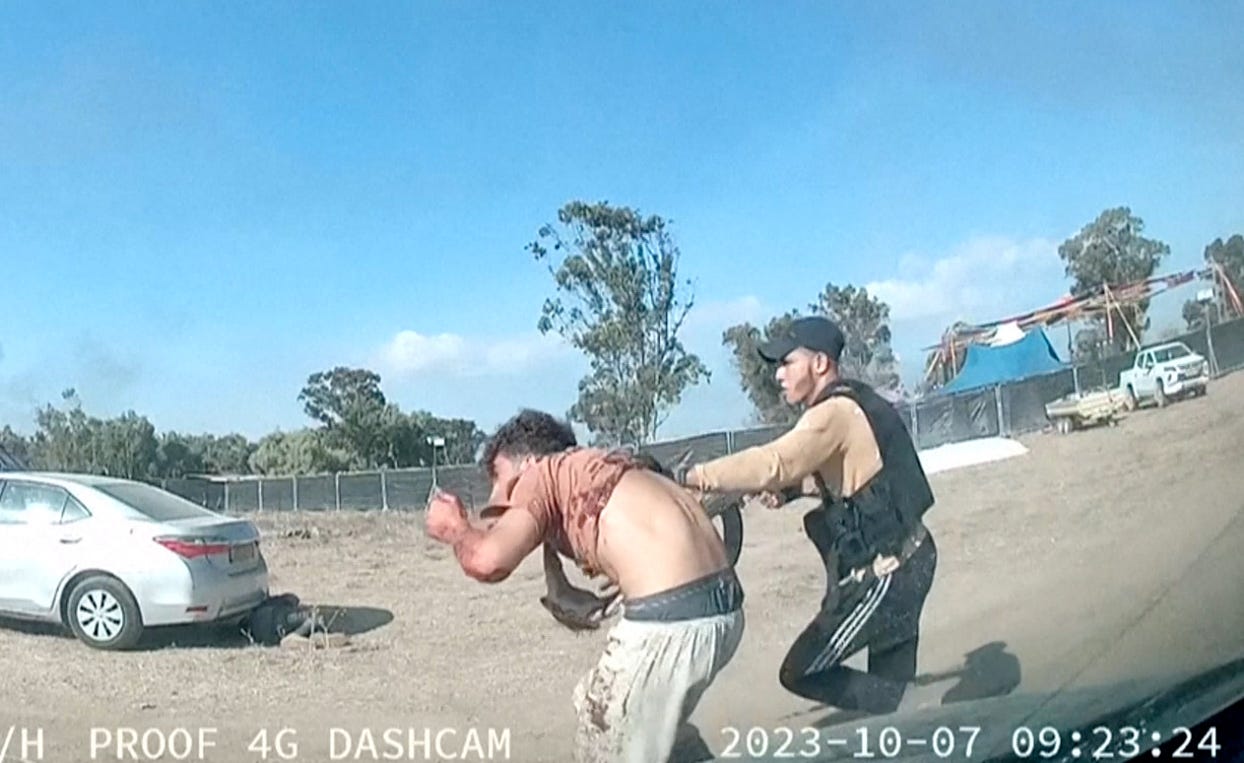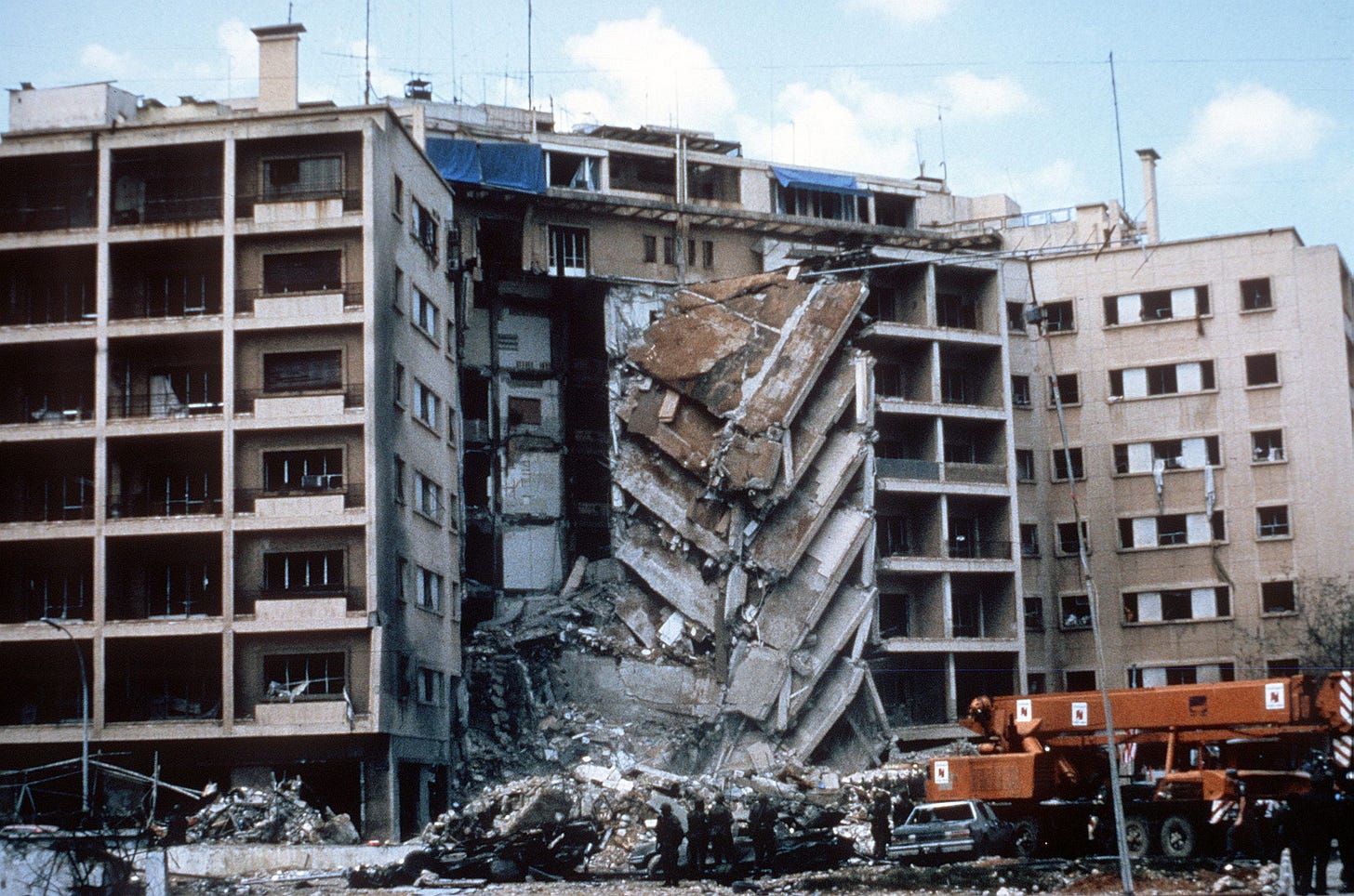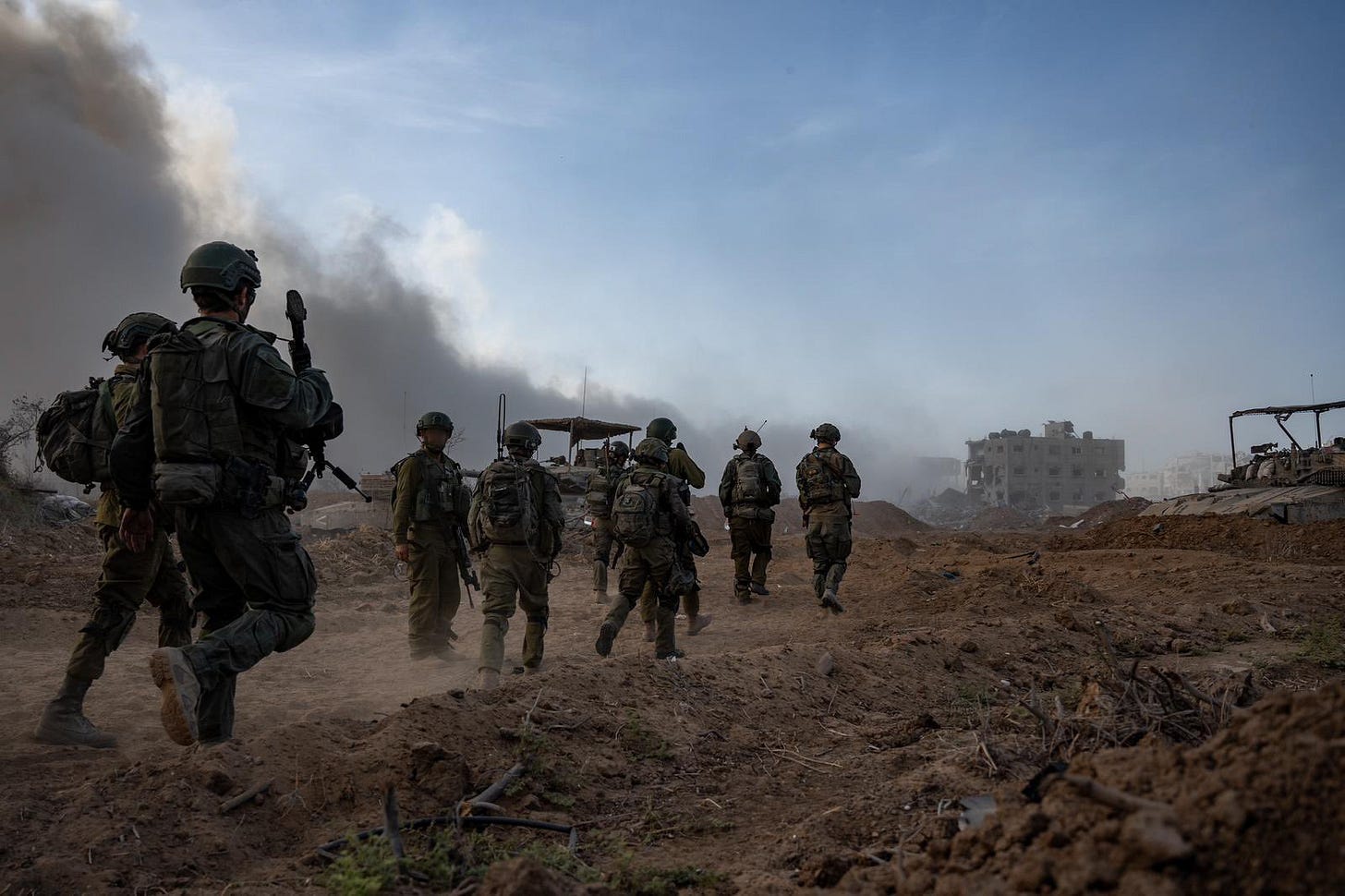Only Israel is forced to negotiate with terrorists.
Instead of gratitude, Israelis are often met with condemnation, scrutinized under a microscope of hypocrisy — even though we embody the spirit of defiance against unhinged anti-Western violence.

Please consider supporting our mission to help everyone better understand and become smarter about the Jewish world. A gift of any amount helps keep our platform free of advertising and accessible to all.
You can also listen to the podcast version of this essay on Apple Podcasts, YouTube Music, YouTube, and Spotify.
Imagine if world leaders demanded that America negotiate with Al-Qaeda after 9/11.
Imagine if “humanitarian organizations” insisted that France reach a diplomatic settlement with ISIS during Operation Chammal in 2014.
Imagine if Nigeria was coaxed into peacefully negotiating with Boko Haram after the terrorist organization abducted 276 schoolgirls a decade ago.
Instead, each of these countries dealt with these terror groups the only way you can: with uncompromising military force. There is no negotiating with terrorists, not because it is technically impossible, but because it elevates them to a status they do not deserve: that of respectable, decent human beings.
Any group that uses indiscriminate large-scale violence aimed at everyday civilians, hijackings, kidnappings, and suicide bombings as a matter of policy and practice is neither respectable nor decent. They must be tackled as such.
Why, then, is the so-called “international community” forcing Israel to negotiate with Hamas and now Hezbollah?
This is not just a sad reality; it is a grotesque theater where the protagonists are forced to engage with those who wish them harm, all under the pretense of seeking peace. Why is it that Israel, a nation that has faced existential threats since its inception in 1948, is the only country expected to extend a hand to those who brandish genocidal weapons against it?
Let’s not kid ourselves. The logic behind this outrageous expectation is deeply flawed. Imagine a situation where a country faces constant aggression from a militant group hellbent on its destruction. Would it not be the height of folly to sit down and negotiate with those who do not recognize your right to exist? Yet, that is precisely what is demanded of Israel time and again.
Already in the 1960s and 1970s, decades before Hamas and Hezbollah were even a figment in the Palestinian imagination, the Israelis understood something that much of the world is just recently realizing.
As Golda Meir, Israel’s prime minister from 1969 to 1974, put it:
“We’re not the only people in the world who’ve had difficulties with neighbors; that has happened to many. We are the only country in the world whose neighbors do not say, ‘We are going to war because we want a certain piece of land from Israel,’ or waterways or anything of that kind.”
“We’re the only people in the world where our neighbors openly announce they just won’t have us here. And they will not give up fighting and they will not give up war as long as we remain alive. Here.”
The global narrative surrounding the Israeli-Palestinian conflict often depicts Israel as the aggressor. In this twisted portrayal, the state’s defense mechanisms are recast as provocative actions. Meanwhile, the terrorists — cloaked in the guise of “freedom fighters” — are humanized, their heinous acts dismissed as mere responses to oppression. It is an absurd inversion of reality, one that Israel is forced to navigate as it attempts to safeguard its roughly 10 million residents.
The irony is palpable: While nations around the world stand firm against negotiating with recognized terrorist organizations, Israel is pressured to make concessions. In the United States, for example, negotiation with groups like ISIS or Al-Qaeda is an unequivocal non-starter. Yet, when it comes to Hamas — an organization that openly celebrates acts of violence against Israeli civilians — the rhetoric shifts dramatically. Suddenly, there is talk of “a diplomatic settlement” and people on “both sides” as if one can reason with those who gushingly embrace a culture of death.
Let’s also consider the track record of these negotiations. History has shown us that time and again, Israel has extended olive branches only to be met with the same old cycle of violence. Treaties and ceasefires become little more than breathing spells for terrorist groups to regroup and strategize their next assault. So, why is it that Israel is held to a different standard? Why is it that when they refuse to negotiate with terrorists, they are painted as the villains of this saga?
The answer lies in a broader narrative of delegitimization that Israel faces on the world stage. There is a peculiar obsession with portraying Israel as the root of all conflict in the Middle East. This narrative feeds the perception that any action taken in self-defense is an act of aggression. And as the world watches, it seems content to ignore the inconvenient truth: The real aggressors are those who have no qualms about sacrificing innocent lives for their ideological goals.
In the cynical chess game of international politics, Israel stands alone — isolated, pressured, and forced to negotiate with its own executioners. The expectation that Israel should play nice with its enemies while they arm themselves for the next onslaught is a tragic joke. It is a farce that has gone on for too long, and the price is paid in more and more Jewish blood. Enough already.
As Israel continues to grapple with this harsh reality, it becomes increasingly clear: The only thing more dangerous than negotiating with terrorists is the international community’s deafening silence when they demand it. Until that changes, the world will continue to witness the absurdity of a nation forced to negotiate its own survival.
And as the cycle of violence spins on, we must ask ourselves: Who will be the next victim of this sickening game?

In the annals of history, few things have proven as tragically misguided as the notion of negotiating with terrorists. It is an exercise not just in futility but in moral equivalence of the most egregious kind. By engaging with those who use terror as a weapon, we not only validate their methods but also blur the lines between right and wrong, good and evil. This is an absurd and dangerous path, one that threatens to erode the very foundations of civilized society.
To negotiate with terrorists is to grant them legitimacy they do not deserve. These are individuals and groups who thrive on fear, whose very modus operandi involves the indiscriminate killing of innocents to further their agendas.
By sitting at the negotiating table with such actors, we are essentially saying that their actions, however heinous, have earned them a seat among the civilized. It is a perverse reward system that encourages more violence, since it demonstrates that terror can indeed achieve political and ideological goals.
Consider the absurdity of equating the grievances of terrorists with those of legitimate actors. Terrorists operate outside the bounds of law and morality. Their demands are often rooted in extremist ideologies that seek to dismantle the very structures of democratic and peaceful societies.
By engaging in negotiations, we are placing their irrational and often genocidal aims on the same pedestal as the legitimate aspirations of oppressed peoples and nations. This is not just a moral failing; it is an affront to those who seek justice through peaceful and lawful means.
Negotiating with terrorists also undermines the principle of justice. Justice demands that those who commit atrocities are held accountable for their actions. It requires a clear and unequivocal response to acts of terror — one that reaffirms the sanctity of human life and the rule of law. By choosing negotiation over retribution, we send a message that justice is negotiable, that the lives lost to terror are bargaining chips rather than sacred entities deserving of respect and protection.
Furthermore, the very act of negotiating with terrorists compromises the security of nations. It emboldens those who believe that violence is a viable path to power. History is replete with examples where concessions made to terrorists have led to further demands and increased violence.
Terrorist organizations are not static; they evolve and adapt, using negotiations as opportunities to regroup, rearm, and launch more sophisticated attacks. Each round of negotiations serves as a strategic pause for them, not a step towards genuine peace.
The moral equivalence inherent in negotiating with terrorists also betrays the victims of terrorism. It reduces their suffering to a mere footnote in the broader political narrative. Their pain and loss become tools in a game of political chess, their voices drowned out by the din of diplomacy.
This is a gross injustice, one that compounds their suffering and dishonors their memory. By negotiating with terrorists, we are effectively saying that their lives were expendable, that their deaths were just another cost of doing political business.
Moreover, this approach sets a dangerous precedent on the global stage. It signals to other would-be terrorists that their actions, no matter how barbaric, can lead to political recognition and influence. It creates a vicious cycle where violence begets negotiation, and negotiation begets more violence.
The long-term implications are dire: a world where terror is a recognized tool of political discourse, where the boundaries of acceptable behavior are continually pushed by those willing to shed innocent blood.

It is soul-crushing and back-breaking to fight wars against terrorists, in large part due to their habitual use of human shields and civilian camouflage, complete disregard for civilian casualties, and ability to develop social media-driven real-time propaganda aimed at portraying Western nations as cunning antagonists who trouce upon “cultural relativism” (the notion that there is no universal standard to measure cultures by, and that all cultural values and beliefs must be understood relative to their cultural context, and not judged based on outside norms and values).
It is the kind of war that leaves societies questioning their very values. But here is the brutal truth: It’s a necessary evil to uphold the very democratic and Western values that our civilized world holds dear.
In this so-called enlightened age, we find ourselves constantly embroiled in conflicts against shadowy figures who revel in chaos and bloodshed. Terrorists, with their twisted ideologies and insatiable appetite for destruction, stand as the antithesis of everything democratic societies cherish.
Liberty, equality, and the rule of law are anathema to these zealots, who seek nothing less than the eradication of our way of life. The idea of negotiating with such entities is not only laughable but suicidal. When faced with an existential threat, the only viable response is overwhelming force.
Oh, but the armchair critics and peace advocates will wring their hands and lament the horrors of war. They will preach about the sanctity of human life and the virtues of diplomacy, conveniently ignoring that terrorists do not play by the same rules. These are not misunderstood “freedom fighters” — they are ruthless killers who view compassion as weakness and diplomacy as a delay in their murderous agenda. The only language they understand is the one spoken through the barrel of a gun and the blast of a bomb.
Engaging in warfare against terrorists is a Sisyphean task, a relentless grind that tests the mettle of even the most powerful nations. It is a war fought in murky urban battlefields, where the enemy hides among civilian infrastructure like schools and mosques, using them as human shields and manipulating the media to paint themselves as victims. The toll on soldiers, both physical and mental, is immense. Yet, for all this suffering, the alternative — allowing terrorists to flourish unchecked — is far worse.
War against terror is not just a physical battle but a moral imperative. It is the defense of a way of life that champions freedom of speech, gender equality, and the right to live without fear. These are values that terrorists abhor and seek to destroy. Allowing them to spread their venomous ideology unchallenged is to surrender the very principles that define Western civilization. It is to concede that tyranny and oppression can coexist with liberty and justice.
Let’s be brutally honest: The “war on terror” is expensive, draining resources that could otherwise be used to improve our societies. The economic burden is staggering, with billions spent on military campaigns, homeland security, and aid to destabilized regions. And for what? To dismantle networks that seem hydra-headed, growing new leaders and followers as quickly as we can eliminate them. But consider the alternative — a world where terrorists dictate terms, where fear stifles innovation, and where the darkness of extremism snuffs out the light of progress.
Critics will argue that war only begets more violence, that our actions breed the very hatred we seek to extinguish. There is some truth to this; every drone strike and military incursion can create a new generation of radicals. But the fault lies not in our response but in the twisted ideologies that drive these terrorists. We are not the cause; we are the response. And sometimes, the response must be swift and brutal to be effective.
It is a bitter pill to swallow, but the reality is that war with terrorists is a necessary evil. It is a gruesome, punishing endeavor that tests our resolve and our humanity. Yet, in this grim struggle, we must remain steadfast. The cost of inaction is far greater than the toll of war. It is the erosion of the very values that make our societies worth defending.
So, we fight.
We fight not because we want to, but because we have to. We fight to preserve a world where democracy, freedom, and justice prevail over tyranny, fear, and hatred. It is a savage necessity, but one we must embrace if we are to uphold the ideals that define us.
Perhaps the civilized world, one day, will appreciate Israelis for sacrificing our loved ones on the frontlines of all this mayhem, for we already are and have been for quite some time, dating back decades. Had Israel not existed, as so many people seem to desire, the fight would already be pounding on the doorsteps of Europe, Australia, and North and South America.
Israel has been the bulwark against the tide of extremism, absorbing blows that would otherwise have fallen on the West. We are the shield that has prevented the encroachment of terror into the heart of other nations. But this shield comes at a heavy price — paid in the blood of our sons and daughters, our husbands and wives.
Ironically, Israel is the country best-positioned to deal with Jihadist terrorism. With decades of experience in combating terror, our intelligence agencies are among the most advanced in the world. We have developed strategies, technologies, and tactics that are now emulated by other countries facing similar threats. Our soldiers, hardened by years of conflict, possess a level of expertise that is unmatched. Yet, instead of gratitude, we are often met with condemnation, our actions scrutinized under a microscope of hypocrisy.
While other nations debate the moral quandaries of dealing with terrorists, Israel acts out of necessity. We do not have the luxury of theoretical discussions when rockets rain down on our cities, when suicide bombers target our civilians, when terrorists kidnap our women, children, and elderly. Our response is swift and decisive because it must be. Each day is a battle for survival, and in this relentless war, hesitation means death.
The world should recognize that Israel's fight against terrorism is not just an Israeli fight — it is a global fight. The methods and intelligence we develop are shared with allies, helping to thwart attacks far beyond our borders. (Just yesterday, it was reported that the Mossad, Israel’s foreign intelligence service, has prevented more than 50 Iran-backed attacks against Jews abroad since October 7th.1)
Israelis are the testing ground, the frontline, and the experts in a war that knows no boundaries. Our sacrifices and successes should be a rallying cry for unity against a common enemy, not a point of division.
In standing firm against terrorism, Israel exemplifies the resilience and determination that are the hallmarks of democratic societies. We embody the spirit of defiance against tyranny and violence, a spirit that should be celebrated and supported by all who value freedom.
It is high time the world acknowledged this and stood with Israel, not only in words but in deeds. For in the fight against terror, Israel is not just defending its own land but the very essence of what it means to be free.
“Mossad stopped over 50 Iran-backed attacks against Jews abroad since Oct. 7 - sources.” The Jerusalem Post.



Thank you for this powerful piece. Those here in the US who most need to read it won’t. I will, regardless, share this with as many people as possible. So many I’m surrounded by keep their heads in the sand.
I dont find the "civilized world" to be particularly civilized. I find it grossly hypocritical and often unable to distinguish right from wrong. I am ashamed that my country the United States appears to be slipping to the level of the others.